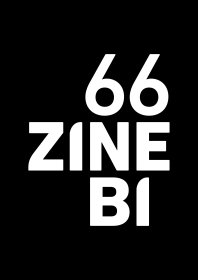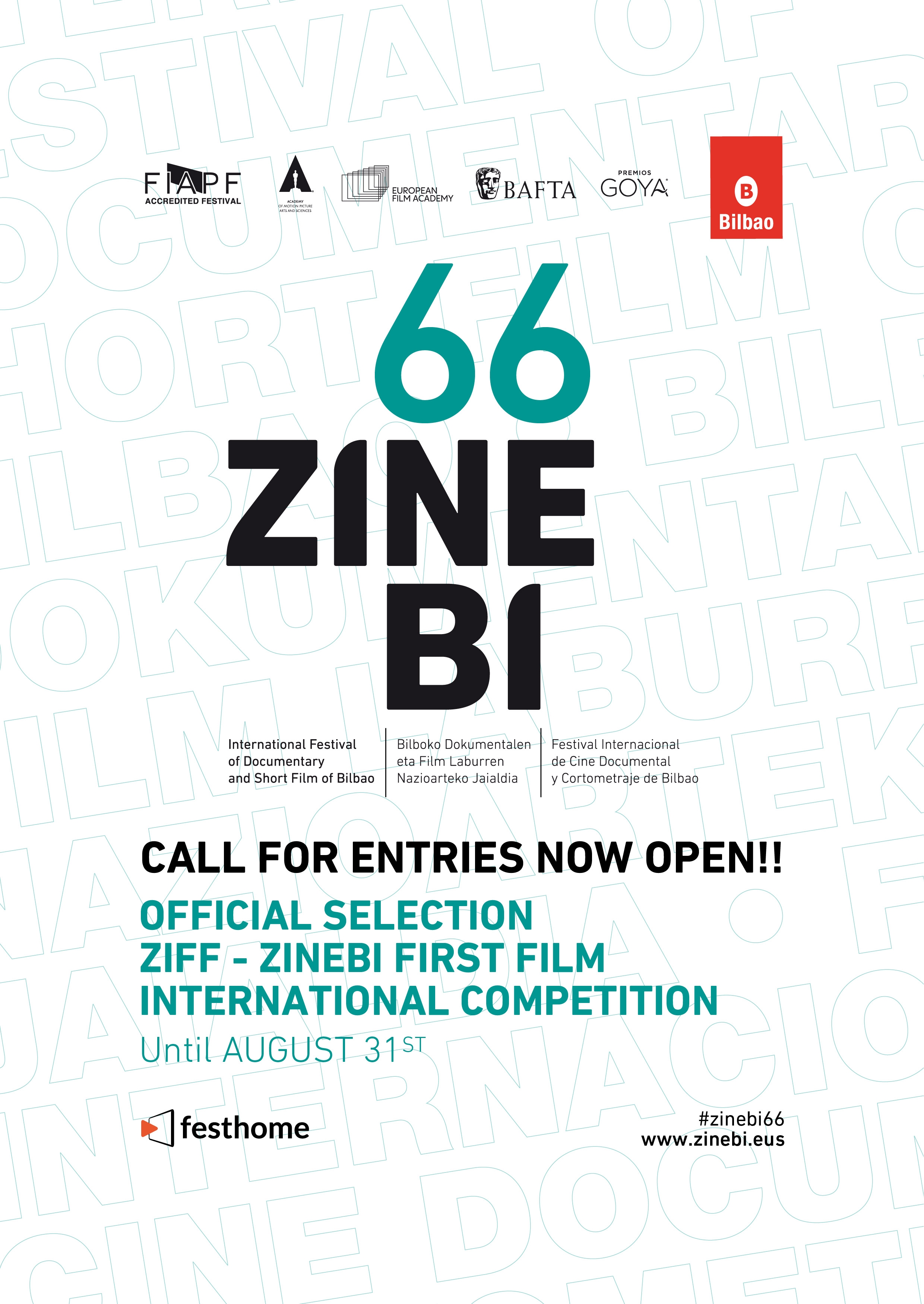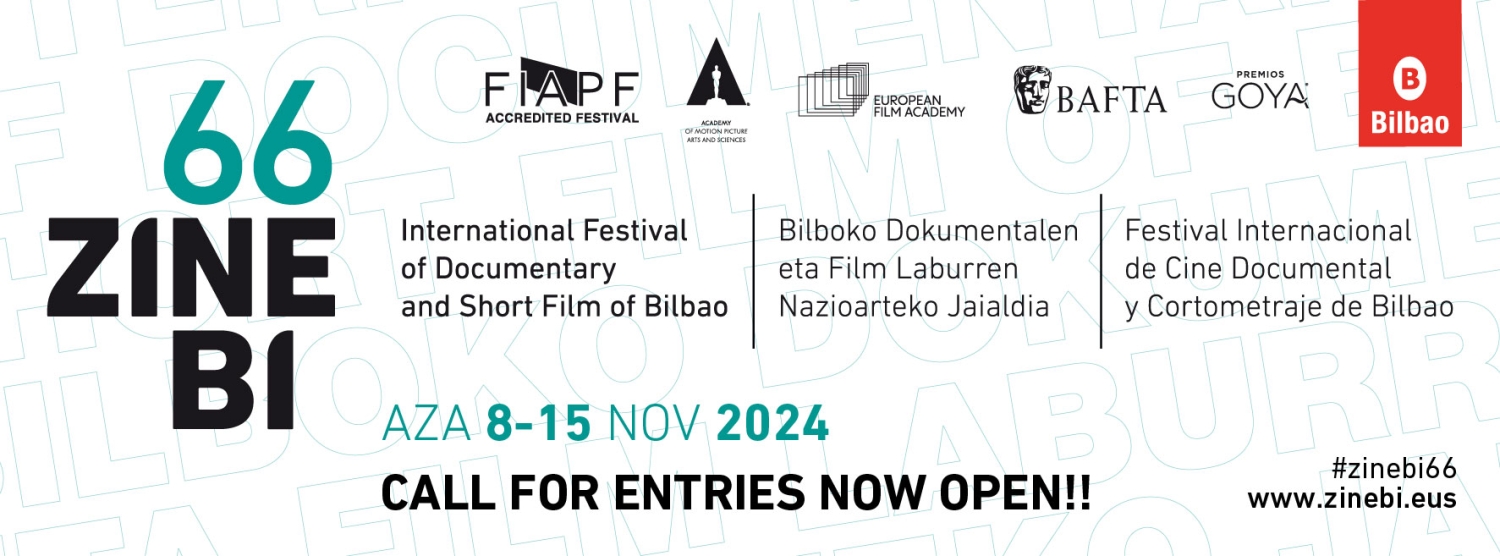
ZINEBI- International Festival of Documentary adn Short Film of Bilbao
ZINEBI is the only Class A international festival in the documentary and short film category in Spain. It is accredited by the Hollywood Academy of Motion Picture Arts and Sciences as a qualifier for the Oscars, for the European Film Academy’s awards, for the British BAFTAs and for the Spanish Academy’s Goyas.
Created in 1959 by the Basque Institute of Hispanic Culture, attached to the Spanish Foreign Ministry, the International Ibero-American and Filipino International Documentary Film Contest (its original name) was devised to follow in the steps of San Sebastián, which had been set up six years earlier. It is the third oldest festival in the Spanish State, after San Sebastián and Valladolid, and the first amongst those in its field. Between 1972 and 1981, it became a platform to discuss Spanish short films and a space for the dissemination of productions from all over the world, and particularly Latin America. In 1974, it was recognised by the International Federation of Film Producers Associations (FIAPF) as a contest of the highest international competitive category. Between 1975 and 1980, it was the ideal forum to discuss the arrival of what would be known as Basque cinema.
In 1981, the festival passed to the hands of Bilbao City Council. Since the year 2000, it embarked on a new era under the ZINEBI brand, when it would consolidate its position as one of the most important international festivals in its speciality. It has strived to be a platform for Spanish and Basque producers and directors and has contributed, as one of its fundamental goals, to internationally promoting the quality and independent films made around the world: films whose creative ambition is not exhausted by merely repeating hackneyed stylistic characteristics. Thanks to these very free and exceptional works, ZINEBI continues to renew its commitment each year to formal experimentation, to the interdisciplinary and hybrid of the new audiovisual productions, to support for the up-and-coming producers, and to filmmakers’ aesthetic and ethical scrutiny of the increasingly more complex realities of our contemporary world.
Throughout its long history, the festival has welcomed to Bilbao some of the most prestigious professionals of independent filmmaking worldwide. The accolades of ZINEBI include the names of Jacques Demy, Richard Lester, Pierre Pérrault, Claude Lelouch, Gian Vittorio Baldi, Carroll Ballard, Fernando Birri, Estela Bravo, Santiago Álvarez, Valeria Sarmiento, Robert L. Drew, Felipe Cazals, Peter Watkins, Peter Mullan, Lourdes Portillo, Avi Mograbi, Sergei Loznitsa, Lászsló Nemes, Nele Wohlatz and Luise Donschen. Thanks to its critical debate and specialisation, the festival has been a test bed for the new trends of contemporary cinema and a useful platform for the most daring filmmakers.
A similar headcount of the ranks of Spanish cinema reveals that the Bilbao Festival has been the launchpad of several generations of filmmakers: Carlos Saura, Basilio M. Patino, Pío Caro Baroja, José Val del Omar, Javier Aguirre, Jaime Chávarri, Francesc Betriu, Nadia Werba, Imanol Uribe, Montxo Armendáriz, Pedro Almodóvar, Julio Medem, Fernando León de Aranoa, Juanma Bajo Ulloa, Javier Rebollo, Santiago Segura, Begoña Vicario, Jon Garaño, José María Goenaga, Virginia García del Pino, Neus Ballús, Koldo Almandoz, Isabel Herguera, Asier Altuna, Izibene Oñederra and Natalia Marín.
The festival’s guests, international jury members and winners of the Mikeldi of Honour, its top annual award, include Peter Greenaway, Ennio Morricone, Jean Rouch, Dino Risi, Luis García Berlanga, Hanna Schygulla, Anna Karina, Jane Birkin, Arturo Ripstein, Elías Querejeta, Richard Lester, Pavel Paulikowski, Márta Mészáros, Jeanne Moreau, Anthony Hopkins, Vannessa Redgrave, Emir Kusturica, Liliana Cavani, Carlos Saura, Manuel Gutiérrez Aragón, Jean-Claude Carrière, Patrice Chéreau, Cecilia Roth, Hirokazu Kore-Eda, Juan Ruiz Anchía, Aki Kaurismäki, Marco Bellocchio, Mariano Llinás, Apichatpong Weerasethakul, Wang Bing, Claire Simon, Márta Mészáros, and the Jean-Pierre and Luc Dardenne brothers.
The different ZINEBI directors down through the years have been: Pedro de Ybarra (1959-1968), José Ignacio Uruñuela (1968-1970), Felipe Alfonso Araico and Adolfo Lafarga (1970-1972), Roberto Negro (1972-1981), Manu Pagola (1981-1985), the Executive Committee made up byr José Julián Bakedano, Ernesto del Río, José Antonio Mingolarra y Santos Zunzunegui (1985-1987), Iñaki Acarregui (1987-1988), Luis Iturri (1988-1998) and Ernesto del Río (1999-2017). Vanesa Fernández Guerra has been the director since 2018.
The festival is currently sponsored and institutionally funded by Bilbao City Council – through the Arriaga Theatre – as the organiser, by the Basque Government’s Department of Culture, by the Spanish Ministry of Culture – through the Institute of Cinematography and Audiovisual Arts (ICAA)-, and by Bizkaia Provincial Council. ZINEBI is also supported by private and public entities including Basque Public Television (ETB), Azkuna Zentroa, Golem-Alhóndiga Cinemas, the Fine Arts Museum, Guggenheim Museum, the Sala BBK, the Campos Elíseos Theatre, the University of the Basque Country (UPV/EHU), the French Institute, the Goethe Institute, the SGAE Foundation-Basque Council and the FAS Film Club.
ZINEBI- Festival Internacional de Cine Documental y Cortometraje de Bilbao
ZINEBI es el único festival internacional de Clase A de España en la categoría de documental y cortometraje. Está acreditado por la Academia de Hollywood como calificador para los premios Oscar, para los premios EFA de la Academia del Cine Europeo, para los premios BAFTA de la Academia Británica y para los premios Goya de la Academia Española.
Creado en 1959 por el Instituto Vascongado de Cultura Hispánica, dependiente del Ministerio de Asuntos Exteriores, el Certamen Internacional de Cine Documental Iberoamericano y Filipino de Bilbao (su nombre inicial) fue concebido como hermano menor del Festival de San Sebastián, que había nacido seis años antes. Es, tras el de San Sebastián y el de Valladolid, el tercero más antiguo del Estado y el primero entre los de su especialidad. Entre 1972 y 1981 se convirtió en una plataforma de debate sobre el cortometraje español y en un espacio para la difusión de las cinematografías más variopintas, en especial la latinoamericana. En 1974 obtuvo el reconocimiento de la Federación Internacional de Asociaciones de Productores (FIAPF) como certamen de la máxima categoría internacional competitiva, y entre 1975 y 1980 fue el lugar de debate idóneo para el alumbramiento de lo que empezó a conocerse como cine vasco.
A partir de 1981 el festival fue asumido por el Ayuntamiento de Bilbao y desde el año 2000, bajo la marca de ZINEBI, emprendió una nueva época en la que ha consolidado su posición como uno de los festivales internacionales más importantes de su especialidad, desde la que intenta servir de plataforma a realizadores y directoras de Euskadi y el Estado y ha contribuido, como uno de sus objetivos fundamentales, a la promoción internacional del cine independiente y de calidad que se realiza en los cinco continentes: películas cuya ambición creativa no se agota en la repetición de rasgos estilísticos estereotipados, obras muy libres y singulares que permiten a ZINEBI renovar anualmente su apuesta por la experimentación formal, por la condición híbrida e interdisciplinar de las nuevas producciones audiovisuales, el apoyo a los realizadores emergentes, y la indagación ética y estética de los cineastas en las cada vez más complejas realidades de nuestro mundo contemporáneo.
A lo largo de la dilatada historia del festival, han pasado por Bilbao algunos de los más prestigiosos profesionales del cine independiente mundial. En el palmarés de ZINEBI destacan los nombres de Jacques Demy, Richard Lester, Pierre Pérrault, Claude Lelouch, Gian Vittorio Baldi, Carroll Ballard, Fernando Birri, Estela Bravo, Santiago Álvarez, Valeria Sarmiento, Robert L. Drew, Felipe Cazals, Peter Watkins, Peter Mullan, Lourdes Portillo, Avi Mograbi, Sergei Loznitsa, Lászsló Nemes, Nele Wohlatz, Luise Donschen o Fern Silva. El festival, desde el debate crítico y la especialización, ha servido de banco de pruebas de las nuevas tendencias del cine contemporáneo y una plataforma útil para los cineastas más arriesgados.
Un recuento similar entre las filas del cine español, permite señalar que en el Festival de Bilbao han emergido realizadores de varias generaciones distintas: Carlos Saura, Basilio M. Patino, Pío Caro Baroja, José Val del Omar, Javier Aguirre, Jaime Chávarri, Francesc Betriu, Nadia Werba, Imanol Uribe, Montxo Armendáriz, Pedro Almodóvar, Julio Medem, Fernando León de Aranoa, Juanma Bajo Ulloa, Javier Rebollo, Santiago Segura, Begoña Vicario, Jon Garaño, José María Goenaga, Virginia García del Pino, Neus Ballús, Koldo Almandoz, Isabel Herguera, Asier Altuna, Izibene Oñederra o Natalia Marín.
Entre sus invitados, jurados internacionales o galardonados con el Mikeldi de Honor, su máxima distinción anual, están Peter Greenaway, Ennio Morricone, Jean Rouch, Dino Risi, Luis García Berlanga, Hanna Schygulla, Anna Karina, Jane Birkin, Arturo Ripstein, Elías Querejeta, Richard Lester, Pavel Paulikowski, Márta Mészáros, Jeanne Moreau, Anthony Hopkins, Vannessa Redgrave, Emir Kusturica, Liliana Cavani, Carlos Saura, Manuel Gutiérrez Aragón, Jean-Claude Carrière, Patrice Chéreau, Cecilia Roth, Hirokazu Kore-Eda, Juan Ruiz Anchía, Aki Kaurismäki, Marco Bellocchio, Mariano Llinás, Apichatpong Weerasethakul, Wang Bing, Claire Simon, Márta Mészáros y los hermanos Jean-Pierre y Luc Dardenne.
Desde su fundación, ZINEBI ha tenido los directores siguientes: Pedro de Ybarra (1959-1968), José Ignacio Uruñuela (1968-1970), Felipe Alfonso Araico y Adolfo Lafarga (1970-1972), Roberto Negro (1972-1981), Manu Pagola (1981-1985), el Comité de Dirección formado por José Julián Bakedano, Ernesto del Río, José Antonio Mingolarra y Santos Zunzunegui (1985-1987), Iñaki Acarregui (1987-1988), Luis Iturri (1988-1998) y Ernesto del Río (1999-2017). Desde 2018 la directora es Vanesa Fernández Guerra.
Actualmente el Festival cuenta con el patrocinio y la financiación institucional del Ayuntamiento de Bilbao –a través del C.A.C. Teatro Arriaga- como organizador, del Departamento de Cultura del Gobierno Vasco, del Ministerio de Cultura –a través del Instituto de la Cinematografía y de las Artes Audiovisuales (ICAA)- y de la Diputación Foral de Bizkaia. Además, colaboran con ZINEBI entidades públicas y privadas como la Televisión Pública Vasca (ETB), Azkuna Zentroa, Cines Golem-Alhóndiga, el Museo de Bellas Artes, el Museo Guggenheim, la Sala BBK, el Teatro Campos Elíseos, la Universidad del País Vasco (UPV/EHU), el Instituto Francés, el Goethe Institut, la Fundación SGAE-Consejo de Euskadi y el Cineclub FAS, entre otros.


